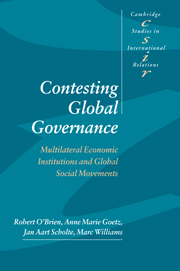Book contents
- Frontmatter
- Contents
- Preface
- List of abbreviations
- 1 Contesting global governance: multilateralism and global social movements
- 2 The World Bank and women's movements
- 3 The World Trade Organization and labour
- 4 The World Bank, the World Trade Organization and the environmental social movement
- 5 The International Monetary Fund and social movements
- 6 Complex multilateralism: MEIs and GSMs
- References
- Index
- CAMBRIDGE STUDIES IN INTERNATIONAL RELATIONS
3 - The World Trade Organization and labour
Published online by Cambridge University Press: 22 September 2009
- Frontmatter
- Contents
- Preface
- List of abbreviations
- 1 Contesting global governance: multilateralism and global social movements
- 2 The World Bank and women's movements
- 3 The World Trade Organization and labour
- 4 The World Bank, the World Trade Organization and the environmental social movement
- 5 The International Monetary Fund and social movements
- 6 Complex multilateralism: MEIs and GSMs
- References
- Index
- CAMBRIDGE STUDIES IN INTERNATIONAL RELATIONS
Summary
This chapter examines the relationship between the World Trade Organization (WTO) and labour. The analysis proceeds in the following manner. Firstly, an overview is provided of the WTO and its significance. Secondly, the global labour movement is profiled and some preliminary points are made about its status in the social movement and NGO community. Thirdly, labour's engagement with international economic institutions other than the WTO is surveyed. Fourthly, labour's particular concern with the WTO is explained. Fifthly, labour participation in the first ministerial meeting of the WTO is examined for what it reveals about both the WTO and labour. Sixthly, the general relationship between NGOs and the WTO is surveyed. Finally, the implications of the WTO–labour engagement for the International Labour Organisation is considered.
The primary argument of the chapter is that labour's inability to advance its concerns in the WTO framework risks losing a potentially significant constituency. Organised labour is more supportive of the WTO's trade liberalisation project than other elements of the social movement community. Disagreement with various NGOs over the social clause issue highlights organised labour's desire to work within dominant institutions. However, the meagre results of the WTO Singapore Ministerial meeting, continued resistance at the WTO and increased opposition to reform of the ILO put continued cooperation in doubt. For a multilateral institution seeking to sink roots in national societies such a development should be a cause for concern.
- Type
- Chapter
- Information
- Contesting Global GovernanceMultilateral Economic Institutions and Global Social Movements, pp. 67 - 108Publisher: Cambridge University PressPrint publication year: 2000
- 1
- Cited by



